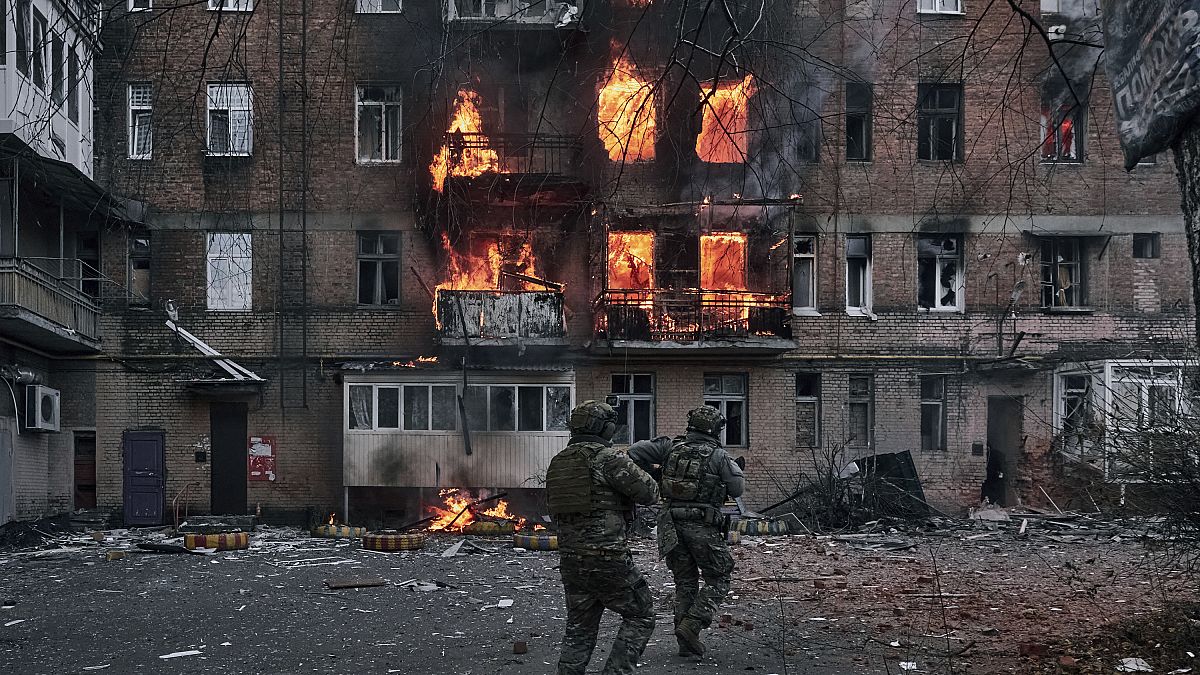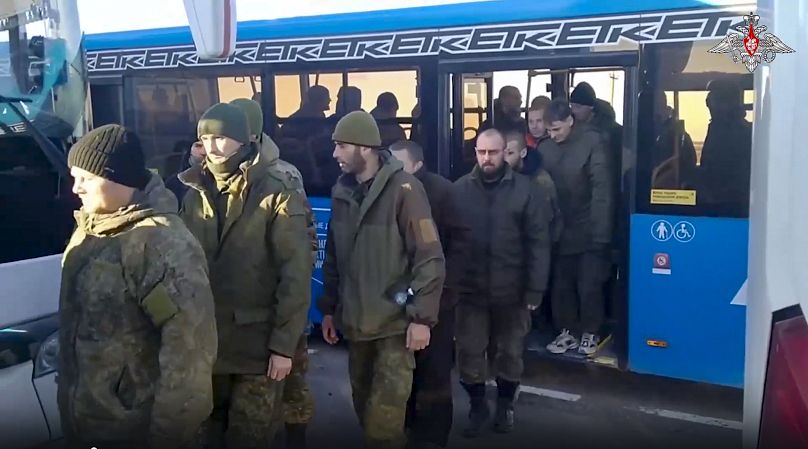Here is our summary of the latest news on Russia's invasion of Ukraine.
1. Kremlin: Up to Zelenskyy to end Ukraine war
The Kremlin said on Thursday it is up to Zelenskyy to end the military conflict in Ukraine, amid vows by Russia's president to press on the grinding invasion.
Ukrainian President Voldymyr "Zelenskyy knows when it may end. It may end tomorrow if he wishes so", said Kremlin spokesman Dmitry Peskov.
The Kremlin has long said that Ukraine must accept Russian conditions to end the fighting, demands Ukraine rules out.
Russia wants Kyiv to recognise Crimea — a Ukrainian peninsula that Moscow illegally annexed in 2014 — as part of Russia and give Moscow the land it has captured so far.
Zelenskyy and other Ukrainian officials have repeatedly rejected those conditions, saying the war will end when the occupied territories are retaken or Russian forces leave them.
In an attempt to prepare his country for more bloodshed, Putin said Wednesday that the fighting in Ukraine “could be a lengthy process.”
2. Kremlin admits 'risk' of Ukrainian attacks in Crimea
Russia's military claims it has shot down a drone near the Sevastapol port which hosts its Black Sea fleet.
Sevastopol Governor Mikhail Razvozhaev said on Telegram that a Russian ship "shot down a UAV over the sea" on Thursday morning.
Russia's Black Sea fleet was targeted in October in what authorities described as a "massive" drone attack, which damaged one ship and led Moscow to briefly withdraw from the UN-brokered grain deal.
On Thursday, Kremlin spokesman Dmitry Peskov claimed "there are risks" of Ukrainian attacks in Crimea, which was annexed by Russia in 2014.
But Peskov said the fact the drone was shot down "shows that effective countermeasures are being taken".
The region has reportedly been hit by several drone strikes in recent months, including one that destroyed a military airfield in August.
The Kerch bridge, which connects the peninsula to the Russian mainland, was also damaged by an explosion that Moscow has blamed on Ukrainian military intelligence.
"There are risks because the Ukrainian side continues to follow its line of organising terrorist attacks," Kremlin spokesman Dmitry Peskov said on Thursday.
Russian President Vladimir Putin visited the reconstructed bridge this week for the first time since the invasion of Ukraine began in February.
After Ukrainian forces recaptured the southern city of Kherson, Moscow said it was carrying out "fortification work" on the peninsula to "ensure the safety of Crimeans".
Peskov told reporters that "effective measures" were being taken in Crimea, without giving further details.
Deadly explosions have been reported at Russian airbases, located hundreds of kilometres from the Ukrainian border. Moscow blamed Ukraine, which didn’t claim responsibility.
The Kremlin said on Thursday that its forces are still set on seizing annexed parts of eastern and southern Ukraine. Kyiv and its western allies said the so-called referendums in September were an "illegal sham".
None of the four provinces -- Donetsk, Kherson, Luhansk, or Zaporizhzhia -- are fully under Russian control.
Russia's security service (FSB) also said it had arrested two people from Sevastapol on suspicion of passing on "information on the location of Russian Defence Ministry facilities" to Ukraine.
In a statement, the FSB said that one of the suspects was recruited by Kyiv in 2016. Both suspects face up to 20 years in prison on charges of "high treason".
Meanwhile, Ukraine's Security Service (SBU) says it has detained a married couple suspected of spying for Russia in the Black Sea port city of Odesa.
3. Ukraine faces 'significant' power shortages as Russian strikes persist
Ukraine enforced new emergency power cuts on Thursday as it tried to repair energy infrastructure damage from Monday's airstrikes.
The national grid operator Ukrenergo said the attacks had caused significant supply shortages amid freezing winter temperatures.
"Because of damage caused by missile strikes to power plants and the high-voltage network, the system has a significant shortage of electricity," a statement read.
DTEK, Ukraine's largest private power producer, also said there were now emergency power cuts in the capital Kyiv, the southern region of Odesa, and in Dnipro in central Ukraine.
"In all regions, there is a lack of energy -- up to a third of what is needed," said Oleksandr Starukh, governor of the Zaporizhzhia region.
Russia has increased attacks on energy facilities in recent weeks, saying strikes on vital infrastructure are militarily legitimate and denying allegations that it has targeted civilians. On Thursday, President Putin vowed to press on with the fighting despite Western criticism.
Putin has also blamed Kyiv for "not supplying water" to Russian-held areas in Donetsk, accusing the West of turning a blind eye to Ukraine's actions.
On Wednesday, Putin acknowledged that Russia's "special military operation" in Ukraine can be a "long" process.
NATO Secretary General Jens Stoltenberg says that Moscow wants to freeze fighting in Ukraine over the winter to build up its forces for a new assault in the spring.
Ukraine has labelled the strikes on its energy infrastructure a war crime. Blackouts have become frequent and the Kyiv government has urged residents to conserve energy by reducing the use of domestic appliances.
“In Ukraine today, the ability of civilians to survive is under attack,” said Martin Griffiths, head of the UN humanitarian office.
Ukrenergo said the most difficult situation was in eastern areas of Ukraine, such as Bakhmut, which Russian forces have been trying to take for months amid intense fighting.
President Zelenskyy said on Wednesday that Russian shelling killed 10 people and wounded many others in the Donetsk town of Kurakhove.
Kyiv claims that its forces have liberated "1,888 localities" while more than 93,000 Russian personnel have been killed since February. The reports have not been independently verified.
4. Red Cross calls for more access to Russian and Ukrainian prisoners of war
The International Committee of the Red Cross (ICRC) has called for more access to visit prisoners of the Ukraine war.
ICRC representatives recently visited prisoners from both sides, amid allegations of abuse and torture.
The delegates were reportedly able to assess the living conditions and treatment of the prisoners and distribute books, hygiene products, blankets, and warm clothes.
But the organisation has expressed frustration that it has not been allowed to visit all POWs, as detailed in the Geneva Convention.
"While the recent visits are important progress the ICRC must be granted unimpeded access to see all prisoners of war repeatedly and in private, wherever they are held," a statement read.
"We have seen hundreds of POWs, but we still don't have access to all of them," a spokeswoman added.
"Families suffer under the burden of not knowing how their loved ones are, whether they are healthy or sick, or even whether they are alive or dead."
Zelenskyy has often criticised the ICRC, saying it has not done enough to visit captured Ukrainian soldiers in Russia.
"Other visits are planned between now and the end of the month," the Red Cross said on Thursday.
The UN human rights office said last month that its monitors had not been allowed access to Ukrainian prisoners of war held by Russia.
Around 10,000 Ukrainian service personnel and another 10,000 civilians are being held in Russian detention facilities, according to Kyiv.
5. Risk of nuclear weapons has diminished, says Germany's Scholz
The risk of Moscow using nuclear weapons in the Ukraine war has diminished because the international community "has drawn a red line" at Russia, according to German Chancellor Olaf Scholz.
"One thing has changed for the moment: Russia has stopped threatening to use nuclear weapons," the chancellor said in an interview published on Thursday.
"For the time being, we have put a stop to it," Scholz said, referring to the international community.
His comments come after a recent visit to China to meet with Chinese Premier Xi Jinping.
"During my visit to Beijing, President Xi and I jointly declared that nuclear weapons should not be used. Shortly afterwards, the G20 countries reaffirmed this position," said Scholz.
After several threats to use nuclear weapons from Russian officials in recent months, Putin suggested on Wednesday that Moscow would only use nuclear weapons in response to such an attack.
"We used to consider weapons of mass destruction, nuclear weapons, as a means of defence," he said.
The Russian president however said "the threat of a nuclear war is growing", given the Russia-West confrontation over Ukraine, blaming the Americans and Europeans.
US State Department spokesman Ned Price later stated that "any light-hearted talk about nuclear weapons is absolutely irresponsible".
Asked about the recent controversy triggered by French President Emmanuel Macron, who felt that Russia should be given "guarantees" to find a good balance once the war in Ukraine was over, Scholz acknowledged that in the long run, the question of the security architecture would arise.
"The priority is for Russia to end the war immediately and withdraw its troops," he said. "It is true that it is then a question of how we can ensure Europe's security."
"We are of course ready to discuss arms control in Europe with Russia. We proposed this before the war and this position has not changed," he added.
6. Son of Putin ally cleared of flying drone in Norway
The son of a Russian businessman close to Vladimir Putin has been acquitted of violating Norway's new laws against drones.
Andrey Yakunin was arrested in the Arctic in October after flying "drones and electronic devices" over the archipelago of Svalbard during the summer.
Under Norwegian law, it is prohibited for aircraft operated by Russian companies or citizens "to land on, take off from, or fly over Norwegian territory."
The legislation was introduced earlier this year following Russia's invasion of Ukraine and amid reports of drone sightings near offshore oil and gas platforms.
Several Russian citizens have been detained for flying drones or taking photographs of sensitive sites in Norway, a NATO member.
But the district court ruled that Yakunin had been flying the drone for recreational purposes and had not "committed a criminal act".
The prosecution, which had asked Yakunin to be jailed for 120 days, appealed the verdict.
The 47-year-old is the son of Russian businessman Vladimir Yakunin, a longtime acquaintance of Putin, who was sanctioned by the US after Moscow annexed Crimea.
Andrey Yakunin left St. Petersburg in 2008 and now living in Italy, claims to have condemned Russia's invasion of Ukraine.

